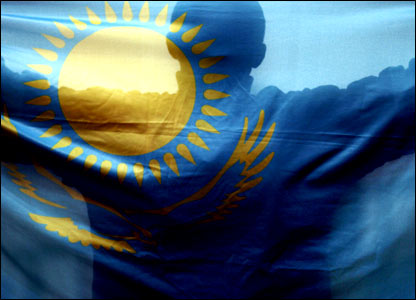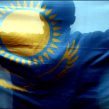
Kazakh Nationalists as a Wild Card in Kazakhstan’s Domestic Politics
Publication: Eurasia Daily Monitor Volume: 10 Issue: 213
By:

Following the recent inter-ethnic clashes in Moscow’s Biryulyovo suburb in mid-October, a growing number of Russia-watchers have been predicting the forthcoming establishment of a new nationalist political party. As Russia’s economic growth is slowing down and the country’s political system is invariably corrupt and inefficient, this radical formation might have all the chances to capitalize on the ordinary Russians’ ire against the ruling elite. In neighboring Kazakhstan, local nationalist forces are similarly rumored to entertain plans to set up a formal political structure. However, contrary to the Russian case, Kazakhstan’s nationalist party would be more concerned with the defense of the national interest against encroachment from outside powers, rather than simply focused on labor migration.
As early as this August, the Socialist Movement of Kazakhstan, a left-wing youth organization defending internationalist slogans, wrote on its website that a group of nationalist leaders had purportedly received $500,000 directly from the Kazakhstani president’s administration to expand their activities. These would presumably include continued protests against Russia’s presence at the Baikonur Cosmodrome. As the authors of this post explained, Kazakhstani authorities might be willing to show Moscow that should the Customs Union of Russia, Belarus and Kazakhstan not deliver expected results, Astana would be compelled to reconsider its own membership in this economic bloc under heavy popular pressure. Such public figures as Kazakh poet Mukhtar Shakhanov, economist Mukhtar Taizhan, or Makhambet Abzhan, the head of the Shanyrak public association, were identified as potential founders of a similar anti-Russian group (Respublika-kz.info, November 4; Socialismkz.info, August 21).
While none of the above-mentioned nationalist activists has confirmed the veracity of such reports, it may still be possible that the presidential administration is studying the possibility of putting this heterogeneous group of people to the service of today’s regime. However, in the last few years, Kazakh nationalists became a relatively autonomous and increasingly well-organized community capable of mobilizing popular support and suggesting alternative policies. Back in November 2009, when the government submitted to public scrutiny the so-called Doctrine of National Unity elaborated in line with President Nursultan Nazarbayev’s October speech before the Assembly of the People of Kazakhstan, this proposal was met with fierce criticism by most nationalist leaders. Conceived as a social development strategy, this document referred to the country’s citizens as the “Kazakhstani nation” united by common history and shared values and beliefs (Elections-ices.org, November 7, 2009).
At the time, Mukhtar Shakhanov promptly exhorted the authorities to remove all references to the “Kazakhstani nation,” saying that such simply did not exist. He also promised to organize a hunger strike if the document was published in its initial wording. Later in April 2010, when the Doctrine of National Unity was finally unveiled, Shakhanov told the local press that the government had carefully studied his recommendations and not only excluded controversial terms but also mentioned the need for all Kazakhstani citizens to master the state language. The language controversy once again came to the public fore in September 2011, when a group of 138 public figures, including Shakhanov, addressed an open letter to President Nazarbayev, the prime minister and the heads of the two chambers of parliament, asking them to strip the Russian language of its special status granted by the constitution (Today.kz, September 5, 2011; Inform.kz, April 29, 2010; Meta.kz, November 25, 2009).
The defense of Kazakhstan’s sovereignty and territorial integrity has been another focal issue for Kazakh nationalists. In December 2009, they staged a protest near China’s consulate in Almaty over the presumed transfer of over 1 million hectares of arable land to Chinese farmers. Earlier, Nazarbayev had said that both countries might explore projects in agriculture, including the creation of joint-ventures on Kazakhstani soil. In order to appease the public opinion, the agriculture ministry offered a detailed explanation of the president’s statement, confirming the impossibility of land transfers to foreign nationals. Even Prime Minister Karim Massimov had to reassure his fellow citizens that the government would act in full compliance with the constitution, which prohibits the sale or the long-term lease of land to overseas companies (Kt.kz, December 14, 2009).
However, the major target of the nationalist discourse has lately been Russia’s presence in Kazakhstan. Most recently, some of the self-proclaimed patriotic elements of Kazakhstani society initiated the creation of a public association to demand the suspension of Russian rocket launches from Baikonur. In early July, they staged protests before Russia’s embassy and consulates in Astana, Almaty and Uralsk, after a Proton rocket crashed in the Kyzylorda province, provoking fears about an eventual environmental disaster (see EDM, September 30). Back in March 2013, some 500 delegates of both moderate opposition movements and openly nationalist circles gathered in Almaty to vote in favor of a nationwide referendum concerning Kazakhstan’s participation in the Customs Union. This referendum was also intended to serve the purpose of securing the nationalization of key industrial enterprises, the direct election of governors at all levels and the permanent ban on the construction of nuclear power plants in Kazakhstan. Although this gathering did not meet the required quorum, the nationalists promised to pursue their campaign against the Customs Union, which may now be gaining steam in the context of a deteriorating trade balance with both Russia and Belarus (Regnum.ru, April 3).
In the fall of 2011, when Kazakhstan’s political parties were preparing for the early parliamentary elections scheduled for the following January, the Rukhaniyat green party, which had previously espoused a moderately nationalist ideology, attempted to run for parliament. At that time, its candidates were barred from participating in the election due to technical irregularities (News.nur.kz, December 28, 2011). As Astana intends to establish, together with Moscow and Minsk, the Eurasian Union, a nationalist party in the Kazakhstani national legislature may be viewed as an opportunity for the ruling regime to strengthen its bargaining position vis-à-vis the Kremlin. Yet, it remains to be seen whether Kazakh nationalists would be able to assert themselves as an independent political force to be reckoned with. Whatever the probability of such a scenario, their rise may be prompted by the rapidly changing demographics unfavorable to Russia’s influence and an eventual power transition with potentially game-changing outcomes.




